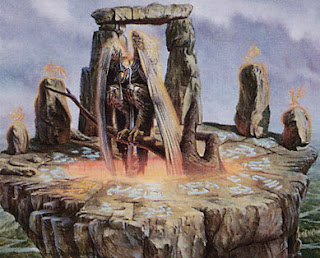Alright this is like draft five, had to scrap the last one cuz it was getting to complex and boring to read about. We don't want that now do we?
This is part one. Later posts are gonna be about specific settings, mechanics and individual examples of the following.
Magic in my games almost always takes one or more of the following five forms.
- Ritual Magic
- Skill Magic
- Rule Magic
- Extrinsic Magic
- Intrinsic Magic
Exactly how they function mechanically depends on which one it is, and the game. As do the more diegetic elements like what you need to do for the rituals.
All of these cross over a lot. They're not distinct categories, just sort of features of the games I run (and I enjoy tying mechanics together in ways that simplify the game).
In detail however...
 |
| Soulcatchers Aerie from Magic the Gathering. Thank theisticGilthoniel for enabling me. |
Ritual Magic
Typically works like this, in that they have specific costs and require specific actions to gain specific results. Often they require some special method of teaching or learning them, a grimoire, scroll or ancient tablet won't cut it, but might be your "key" into actually learning it if that makes sense.
Rituals with specific effects will have specific costs, while rituals with scaling effects will have the necessary cost scale proportionally.
Some rituals may be a bit more flexible or powerful than others, these ones are often especially costly.
Skill Magic
This is for anything from weird languages to divination methods. Mechanically this is usually bound up in the skill system, if there is any. If not then they're liable to have their own sub-system. Either way this is for skills which allow you do to weird things. They aren't spells, and there isn't really a limit to how often you can do these, but they do not guarantee an effect (imagine trying to convince a boulder to get up and crush some heads).
Rule Magic
This refers to the metaphysical rules that interact with magic. Think the metaphysics behind "true names" or the "paradigm" in Magical Industrial Revolution that lets you experiment with stuff. In my own games this takes the form of True Names bestowing a moderate amount of power over the being/person, The Law of Similarity (poppets), The Law of Contagion (using someone's favorite shoes to divine facts about them) and the law of Synecdoche (a lock of hair can be used to cast magic upon someone at a distance).
Generally this is a modification to the previous two forms of magic, mechanically its more of a "theme" that persists throughout my games. "Realistic" magic, that resembles actual magical practices (but with much of the ambiguity stripped away).
Extrinsic Magic
Anything that comes from the external world. In some games this is just magical objects (think the oddities or arcana of Into The Odd) but in many others this is natural things that can be found and have mystical applications. Possibly the most ambiguous, as healing herbs are often nonmagical but still count under this.
Entheogens (psychoactives/psychobotanicals taken for ritual purposes) count under here too. If it comes from things you find, its here.
Intrinsic Magic
Magical "powers." The simplest mechanically. Here is something you can just do. Not necessarily magical in nature, as above, but includes magical things in it. Can also be weird without being magical (psychic powers, pyroclastic glands, other stuff like that).
No Spells? What about wizards?
Nope. I find the traditional way magic is run in games to be fairly bland, and it often seems to try to count a number of different things under the mechanics that frankly shouldn't be under them. Some spells are blatantly rituals while others are implied to be supernatural-quality herbal remedies.
My games typically do not have classes anymore. I prefer to soft-specialize characters without totally removing their ability to do certain things. A "wizard" character would be a character who chose a starting package that granted them rituals or magical skills, who then improved or expanded their skills and knowledge in-game.
If you want some form of Vancian-like casting, some rituals provide temporary power, and while "Pacts" are not mentioned as a type of magic up there, thats because they're a function of several of the previously mentioned ones. A Pact or Covenant of some kind may be able to grant you power beyond your wildest dreams... At a price of course.
Because that's the prime rule of magic right? It always has a price.
No comments:
Post a Comment